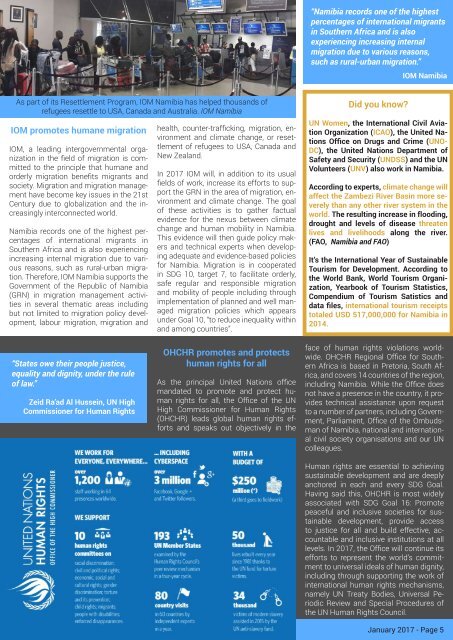UN Namibia
2ktDYIo
2ktDYIo
Create successful ePaper yourself
Turn your PDF publications into a flip-book with our unique Google optimized e-Paper software.
“<strong>Namibia</strong> records one of the highest<br />
percentages of international migrants<br />
in Southern Africa and is also<br />
experiencing increasing internal<br />
migration due to various reasons,<br />
such as rural-urban migration.”<br />
IOM <strong>Namibia</strong><br />
As part of its Resettlement Program, IOM <strong>Namibia</strong> has helped thousands of<br />
refugees resettle to USA, Canada and Australia. IOM <strong>Namibia</strong><br />
IOM promotes humane migration<br />
IOM, a leading intergovernmental organization<br />
in the field of migration is committed<br />
to the principle that humane and<br />
orderly migration benefits migrants and<br />
society. Migration and migration management<br />
have become key issues in the 21st<br />
Century due to globalization and the increasingly<br />
interconnected world.<br />
<strong>Namibia</strong> records one of the highest percentages<br />
of international migrants in<br />
Southern Africa and is also experiencing<br />
increasing internal migration due to various<br />
reasons, such as rural-urban migration.<br />
Therefore, IOM <strong>Namibia</strong> supports the<br />
Government of the Republic of <strong>Namibia</strong><br />
(GRN) in migration management activities<br />
in several thematic areas including<br />
but not limited to migration policy development,<br />
labour migration, migration and<br />
health, counter-trafficking, migration, environment<br />
and climate change, or resettlement<br />
of refugees to USA, Canada and<br />
New Zealand.<br />
In 2017 IOM will, in addition to its usual<br />
fields of work, increase its efforts to support<br />
the GRN in the area of migration, environment<br />
and climate change. The goal<br />
of these activities is to gather factual<br />
evidence for the nexus between climate<br />
change and human mobility in <strong>Namibia</strong>.<br />
This evidence will then guide policy makers<br />
and technical experts when developing<br />
adequate and evidence-based policies<br />
for <strong>Namibia</strong>. Migration is in cooperated<br />
in SDG 10, target 7, to facilitate orderly,<br />
safe regular and responsible migration<br />
and mobility of people including through<br />
implementation of planned and well managed<br />
migration policies which appears<br />
under Goal 10, “to reduce inequality within<br />
and among countries”.<br />
Did you know?<br />
<strong>UN</strong> Women, the International Civil Aviation<br />
Organization (ICAO), the United Nations<br />
Office on Drugs and Crime (<strong>UN</strong>O-<br />
DC), the United Nations Department of<br />
Safety and Security (<strong>UN</strong>DSS) and the <strong>UN</strong><br />
Volunteers (<strong>UN</strong>V) also work in <strong>Namibia</strong>.<br />
According to experts, climate change will<br />
affect the Zambezi River Basin more severely<br />
than any other river system in the<br />
world. The resulting increase in flooding,<br />
drought and levels of disease threaten<br />
lives and livelihoods along the river.<br />
(FAO, <strong>Namibia</strong> and FAO)<br />
It’s the International Year of Sustainable<br />
Tourism for Development. According to<br />
the World Bank, World Tourism Organization,<br />
Yearbook of Tourism Statistics,<br />
Compendium of Tourism Satistics and<br />
data files, international tourism receipts<br />
totaled USD 517,000,000 for <strong>Namibia</strong> in<br />
2014.<br />
“States owe their people justice,<br />
equality and dignity, under the rule<br />
of law.”<br />
Zeid Ra’ad Al Hussein, <strong>UN</strong> High<br />
Commissioner for Human Rights<br />
OHCHR promotes and protects<br />
human rights for all<br />
As the principal United Nations office<br />
mandated to promote and protect human<br />
rights for all, the Office of the <strong>UN</strong><br />
High Commissioner for Human Rights<br />
(OHCHR) leads global human rights efforts<br />
and speaks out objectively in the<br />
face of human rights violations worldwide.<br />
OHCHR Regional Office for Southern<br />
Africa is based in Pretoria, South Africa,<br />
and covers 14 countries of the region,<br />
including <strong>Namibia</strong>. While the Office does<br />
not have a presence in the country, it provides<br />
technical assistance upon request<br />
to a number of partners, including Government,<br />
Parliament, Office of the Ombudsman<br />
of <strong>Namibia</strong>, national and international<br />
civil society organisations and our <strong>UN</strong><br />
colleagues.<br />
Human rights are essential to achieving<br />
sustainable development and are deeply<br />
anchored in each and every SDG Goal.<br />
Having said this, OHCHR is most widely<br />
associated with SDG Goal 16: Promote<br />
peaceful and inclusive societies for sustainable<br />
development, provide access<br />
to justice for all and build effective, accountable<br />
and inclusive institutions at all<br />
levels. In 2017, the Office will continue its<br />
efforts to represent the world’s commitment<br />
to universal ideals of human dignity,<br />
including through supporting the work of<br />
international human rights mechanisms,<br />
namely <strong>UN</strong> Treaty Bodies, Universal Periodic<br />
Review and Special Procedures of<br />
the <strong>UN</strong> Human Rights Council.<br />
January 2017 - Page 5


